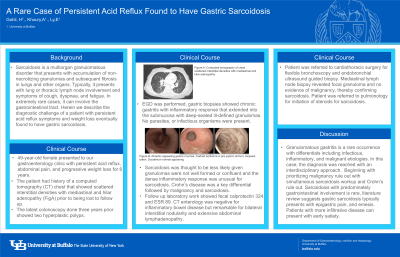Monday Poster Session
Category: Stomach
P3418 - A Rare Case of Persistent Acid Reflux Found to Have Gastric Sarcoidosis
Monday, October 28, 2024
10:30 AM - 4:00 PM ET
Location: Exhibit Hall E

Has Audio

Himaben Gohil, DO
University of Buffalo
Buffalo, NY
Presenting Author(s)
Himaben Gohil, DO1, Anthony Khoury, DO2, Erin K. Ly, MD2
1University of Buffalo, Buffalo, NY; 2University at Buffalo, Buffalo, NY
Introduction: Sarcoidosis is a multiorgan granulomatous disorder that presents with accumulation of non-necrotizing granulomas and subsequent fibrosis in lungs and other organs. Typically, it presents with lung or thoracic lymph node involvement and symptoms of cough, dyspnea, and fatigue. In extremely rare cases, it can involve the gastrointestinal tract. Herein we describe the diagnostic challenge of a patient with persistent acid reflux symptoms and weight loss eventually found to have gastric sarcoidosis.
Case Description/Methods: 49-year-old female presented to our gastroenterology clinic with persistent acid reflux, abdominal pain, and progressive weight loss for 6 years. The patient had history of a computed tomography (CT) chest that showed scattered interstitial densities with mediastinal and hilar adenopathy prior to being lost to follow up. The latest colonoscopy done three years prior showed two hyperplastic polyps. Esophagogastroduodenoscopy (EGD) was performed, gastric biopsies showed chronic gastritis with inflammatory response that extended into the submucosa with deep-seated ill-defined granulomas. No parasites, or infectious organisms were present. Sarcoidosis was thought to be less likely given granulomas were not well formed or confluent and the dense inflammatory response was unusual for sarcoidosis. Crohn’s disease was a key differential followed by malignancy and sarcoidosis. Follow up laboratory work showed fecal calprotectin 324, and ESR 89. CT enterology was negative for inflammatory bowel disease but remarkable for bilateral interstitial nodularity and extensive abdominal lymphadenopathy. Patient was referred to cardiothoracic surgery for flexible bronchoscopy and endobronchial ultrasound guided biopsy. Mediastinal lymph node biopsy revealed focal granuloma and no evidence of malignancy, thereby confirming sarcoidosis. Patient was referred to pulmonology for initiation of steroids for sarcoidosis.
Discussion: Granulomatous gastritis is a rare occurrence with differentials including infectious, inflammatory, and malignant etiologies. In this case, the diagnosis was reached with an interdisciplinary approach. Beginning with prioritizing malignancy rule out with simultaneous sarcoidosis workup and Crohn’s rule out. Sarcoidosis with predominately gastrointestinal involvement is rare, literature review suggests gastric sarcoidosis typically presents with epigastric pain, and emesis. Patients with more infiltrative disease can present with early satiety.
Disclosures:
Himaben Gohil, DO1, Anthony Khoury, DO2, Erin K. Ly, MD2. P3418 - A Rare Case of Persistent Acid Reflux Found to Have Gastric Sarcoidosis, ACG 2024 Annual Scientific Meeting Abstracts. Philadelphia, PA: American College of Gastroenterology.
1University of Buffalo, Buffalo, NY; 2University at Buffalo, Buffalo, NY
Introduction: Sarcoidosis is a multiorgan granulomatous disorder that presents with accumulation of non-necrotizing granulomas and subsequent fibrosis in lungs and other organs. Typically, it presents with lung or thoracic lymph node involvement and symptoms of cough, dyspnea, and fatigue. In extremely rare cases, it can involve the gastrointestinal tract. Herein we describe the diagnostic challenge of a patient with persistent acid reflux symptoms and weight loss eventually found to have gastric sarcoidosis.
Case Description/Methods: 49-year-old female presented to our gastroenterology clinic with persistent acid reflux, abdominal pain, and progressive weight loss for 6 years. The patient had history of a computed tomography (CT) chest that showed scattered interstitial densities with mediastinal and hilar adenopathy prior to being lost to follow up. The latest colonoscopy done three years prior showed two hyperplastic polyps. Esophagogastroduodenoscopy (EGD) was performed, gastric biopsies showed chronic gastritis with inflammatory response that extended into the submucosa with deep-seated ill-defined granulomas. No parasites, or infectious organisms were present. Sarcoidosis was thought to be less likely given granulomas were not well formed or confluent and the dense inflammatory response was unusual for sarcoidosis. Crohn’s disease was a key differential followed by malignancy and sarcoidosis. Follow up laboratory work showed fecal calprotectin 324, and ESR 89. CT enterology was negative for inflammatory bowel disease but remarkable for bilateral interstitial nodularity and extensive abdominal lymphadenopathy. Patient was referred to cardiothoracic surgery for flexible bronchoscopy and endobronchial ultrasound guided biopsy. Mediastinal lymph node biopsy revealed focal granuloma and no evidence of malignancy, thereby confirming sarcoidosis. Patient was referred to pulmonology for initiation of steroids for sarcoidosis.
Discussion: Granulomatous gastritis is a rare occurrence with differentials including infectious, inflammatory, and malignant etiologies. In this case, the diagnosis was reached with an interdisciplinary approach. Beginning with prioritizing malignancy rule out with simultaneous sarcoidosis workup and Crohn’s rule out. Sarcoidosis with predominately gastrointestinal involvement is rare, literature review suggests gastric sarcoidosis typically presents with epigastric pain, and emesis. Patients with more infiltrative disease can present with early satiety.
Disclosures:
Himaben Gohil indicated no relevant financial relationships.
Anthony Khoury indicated no relevant financial relationships.
Erin Ly indicated no relevant financial relationships.
Himaben Gohil, DO1, Anthony Khoury, DO2, Erin K. Ly, MD2. P3418 - A Rare Case of Persistent Acid Reflux Found to Have Gastric Sarcoidosis, ACG 2024 Annual Scientific Meeting Abstracts. Philadelphia, PA: American College of Gastroenterology.
